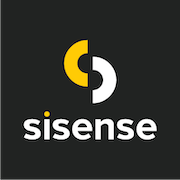Discover the best embedded analytics software for your business needs. Our comprehensive buyer's guide outlines features and benefits to help you make an informed decision. Transform your data into valuable insights today!
Embedded analytics software is quickly becoming an essential component in today's business world. With the ever-increasing amount of data generated each day, organizations are consistently seeking new ways to leverage it to gain a competitive advantage. Embedded analytics software has been a game-changer in this regard by providing users with real-time information that offers insights into their operational efficiency, product performance, and overall business health. With countless analytics solutions in the market, it can be daunting to pick the most effective one that meets your business needs. In this buyer's guide, we will explore the key factors that businesses need to consider when selecting an embedded analytics solution and delve into how it can transform their business operations.
What is embedded analytics software?
In recent years, more and more companies are realizing the value of embedding analytics features within their software applications to help users generate better insights and data-driven decisions. Embedded analytics software enables application developers to integrate data analytics features into their products seamlessly, without disrupting the user experience, enabling the application to provide deeper insights and a competitive edge to users. Studies have shown that 93% of people within applications teams are currently using embedded business analytics.
Some common use cases of this solution include:
Customer analytics:
It help companies understand their customers' behaviors and preferences, enabling them to deliver highly targeted marketing and promotional campaigns.
Sales analytics:
By leveraging embedded analytics, sales managers can identify trends and opportunities based on customer data, such as purchase history and demographics, leading to increased sales performance.
HR analytics:
Embedded analytics in HR software can help HR managers to analyze employee data, including performance evaluations and retention rates, to improve employee engagement and productivity.
Financial analytics:
It can help finance managers to identify potential cost-saving opportunities and forecast financial projections, enabling companies to make data-driven decisions and remain competitive.
Supply chain analytics:
By analyzing supply chain data, embedded analytics can help to optimize the supply chain, improve quality control and reduce operational costs.
The type of companies that use this tool varies widely since it is a technology that can be applied across a wide range of industries. However, small and mid-sized enterprises and enterprise software vendors such as SaaS companies, ERP vendors, and CRM providers are among the most common types of companies that frequently use it.
What are the benefits of investing in an embedded analytics solution?
This is an essential tool that helps businesses make sense of their data by providing meaningful insights that yield effective decision-making outcomes. As companies continue to grow, the challenge of dealing with large data sets increases, and this is where embedded analytics becomes a game-changer. Here are some of the reasons why this technology is crucial:
- Empowers businesses to gain valuable insights: Embedded analytics software provides businesses with real-time data, reports, and visualizations that are easy to understand. This ensures that businesses can monitor their performance, identify trends, and make data-driven decisions.
- Saves time and resources: Without an embedded analytics tool, companies would have to rely on manual methods of data analysis, which consume a lot of time and resources. It automates the data analysis process and presents critical information in a concise and actionable format, saving businesses time and resources.
- Enhances customer satisfaction: It enables businesses to understand their customers' behavior and preferences better. This helps companies tailor their products or services to meet customers' needs and preferences, ultimately driving customer satisfaction.
- Increases revenue: With an embedded analytics program, businesses can better track their sales and marketing efforts and identify what works and what doesn't. This helps companies focus their resources on profitable areas and boost revenue.
- Improves operational efficiency: It also helps businesses track their key performance indicators (KPIs) and identify areas where they can optimize their processes. By streamlining operations, companies can reduce costs and improve efficiency.
10 key features of embedded analytics software
Embedded analytics is a powerful tool that can revolutionize the way you do business. Here are 10 essential features that you can expect from one:
- Real-time Insights: The ability to access and analyze data in real-time is crucial for making informed business decisions.
- Customizable dashboards: Customizable dashboards allow users to view and track data in a way that is personalized to their specific needs.
- Predictive analytics: The use of predictive analytics can be a game-changer for businesses looking to forecast trends and stay ahead of the competition.
- Natural language processing: Natural Language Processing (NLP) technology allows users to ask complex questions and receive data-driven answers in a language they understand.
- Data visualization: Interactive and visually appealing data visualizations can help users better understand and interpret complex data sets.
- Mobile accessibility: With the rise of mobile workforces, it's important that an embedded application is accessible on mobile devices.
- Data security: Strong data security measures must be in place to protect sensitive business information.
- Integration with existing software: The ability to seamlessly integrate with existing software is essential to avoid disruptions in workflow and increase productivity.
- Machine learning: The use of machine learning can help businesses automate tasks and improve operational efficiency.
- Self-service analytics: Empowerment of users through self-service analytics provides the flexibility to quickly access the data they need without relying on IT departments.
What to consider when looking into an embedded analytics system?
With multiple vendors offering embedded applications, it can be challenging to identify the right solution that meets your business needs.
When purchasing one, consider the following factors:
- Integration: Ensure the solution integrates seamlessly with your business intelligence platform and existing data sources. It should provide a single view of data to prevent data silos.
- Customization: Consider a system that allows customization to enable you to incorporate your brand's look and feel. Tailoring analytics to suit your business specifics, such as creating custom filters and reports, is also critical.
- Ease of use: The quality of the user experience is vital to user adoption and productivity. Choose a solution that offers comprehensive documentation and a user-friendly interface to ease the learning curve.
- Scalability: Your organization's analytics needs will grow over time, so choosing a software that scales up or down is essential.
- Security: Evaluate the embedded solution's compliance with security and regulatory standards. Ensure it provides robust access control and encryption capabilities to protect your data.
- Performance: Look for an embedded tool that provides near real-time performance and can handle large datasets. Test performance regularly to confirm it meets your analytics requirements.
- Support: Your analytics solution vendor should provide timely and reliable support to address technical issues promptly.
Market trends for embedded analytics software
In recent years, embedded analytics software has become a cornerstone technology for businesses of all sizes and sectors. By providing in-depth insights into key metrics and data points, it empowers decision-makers to make informed and accurate decisions. According to Allied Market Research, embedded analytics will become a $60.28 billion industry in the next three years. As we look ahead to 2023 and beyond, the pace of innovation in this space shows no signs of slowing down. Here are some of the biggest trends to watch out for:
#1. Augmented analytics
This is set to become one of the biggest trends in this industry this year. The technology leverages machine learning algorithms and natural language processing to automate data preparation, analysis, and insights. This technology will reduce the time and resources required to derive insights from large data sets, making it easier for businesses to make data-driven decisions faster.
#2. Smart data discovery
This is another trend to watch out for in 2024. This technology leverages artificial intelligence and machine learning algorithms to automate the process of discovering insights from data. The algorithms can identify hidden patterns and relationships in data, saving businesses significant amounts of time and resources.
#3. Cloud-based analytics platforms
Cloud-based analytics platforms are on the rise and are expected to continue growing in popularity going further. These platforms offer businesses the flexibility and scalability to analyze data in real-time and make informed decisions based on the latest insights. Cloud-based analytics platforms also eliminate the need for costly hardware investments and reduce the burden of maintaining the infrastructure.
#4. Embedded BI
Embedded BI is another trend that will continue to gain traction in 2024. This technology integrates seamlessly into existing business applications, such as CRM and ERP systems, to provide users with real-time insights and dashboards. It helps to reduce the time and complexity involved in accessing insights, leading to faster and better-informed decision-making.
#5. Focus on data governance
This year, there will be an increased focus on data governance. As the volume and complexity of data continue to grow, ensuring data quality, accuracy, and security will become even more critical. Embedded analytics software will play a crucial role in monitoring and managing data, allowing businesses to ensure compliance and reduce the risk of data breaches.
Embedded analytics systems continue to show immense potential for businesses looking to make data-driven decisions. The trends outlined above show that the pace of innovation in this space shows no signs of slowing down anytime soon. By adopting these trends, businesses can stay ahead of the curve and leverage these technologies to gain a competitive edge.
Conclusion
In summary, embedded analytics emerges as a potent and swiftly expanding technology empowering enterprises to make smarter decisions. By integrating analytical functionalities into existing software applications and workflows, it has become indispensable for maintaining competitiveness. It serves as a crucial asset for companies aiming to make informed, data-driven choices. With its capacity to deliver vital actionable insights, streamline processes, boost customer satisfaction, elevate revenue, and enhance operational efficiency, the integration of this technology is increasingly favored by businesses. By carefully assessing these aspects and selecting a solution that aligns with organizational objectives, companies can augment their business intelligence capabilities and extract valuable insights from their data.









